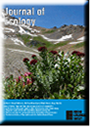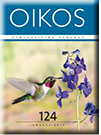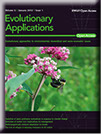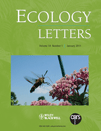:: Publications ::






*undergraduate/postbaccalaureate mentee, +graduate mentee, #postdoctoral mentee
In review/revision/press
- Rose-Person+, A., M.J. Spasojevic, C. Forrester, W.D. Bowman, K.N. Suding, M.F. Oldfather, and N.E. Rafferty. In review. Experimental advancement of snowmelt influences flowering phenology and pollinator visitation in an alpine ecosystem.
- Rose-Person+, A., L.S. Santiago, and N.E. Rafferty. In review. Drought stress influences foraging behavior of a solitary bee on two wildflowers.
2022-2023
- de Manincor#, N, A Fisogni#, and NE Rafferty. 2023. Warming of experimental plant-pollinator communities advances phenologies, alters traits, reduces interactions and depresses reproduction. Ecology Letters 26:323-334. pdf
- Keeler+, AM, and NE Rafferty. 2022. Legume germination is delayed in dry soils and in sterile soils devoid of microbial mutualists: species-specific implications for upward range expansions. Ecology and Evolution 12:e9186. pdf
-
Fisogni#, A, N de Manincor#, CD Bertelsen, and NE Rafferty. 2022. Long-term changes in flowering synchrony reflect climatic changes across an elevational gradient.
Ecography
2022:e06050.
(AF and NdM contributed equally.)
pdf
- Editor's choice
- journal cover photo (credit: C. David Bertelsen)
2020-2021
- Liang+, H, Y-H Zhao, NE Rafferty, Z-X Ren, L Zhong, H-D Li, D-Z Li, and H Wang. 2021. Evolutionary and ecological factors structure a plant-bumblebee network in a biodiversity hotspot, the Himalaya-Hengduan Mountains. Functional Ecology 35:2523-2535. pdf
- Keeler+, AM, A Rose-Person+, and NE Rafferty. 2021. From the ground up: building predictions for how climate change will affect belowground mutualisms, floral traits, and bee behavior. Climate Change Ecology 1:100013. (AMK and ARP contributed equally.) pdf
-
Rafferty, NE, JM Diez, and CD Bertelsen. 2020. Changing climate drives divergent and nonlinear shifts in flowering phenology across elevations.
Current Biology
30:432-441.
pdf
- journal cover photo (credit: C. David Bertelsen)
- accompanying dispatch "Climate change: flowering time may be shifting in surprising ways" by Janet S. Prevey. pdf
2018-2019
- Rafferty, NE, L Agnew*, and PD Nabity. 2019. Parasitism modifies the direct effects of warming on a hemiparasite and its host. PLoS ONE 14:e0224482. (NER and PDN contributed equally.) pdf
- Ollerton, J, and 74 others, including NE Rafferty. 2019. The diversity and evolution of pollination in large plant clades: Apocynaceae as a case study. Annals of Botany 123:311-325. pdf
2016-2017
- Rafferty, NE. 2017. Effects of global change on insect pollinators: multiple drivers lead to novel communities. Current Opinion in Insect Science 23:22-27. pdf
- Morton*, EM, and NE Rafferty. 2017. Plant-pollinator interactions under climate change: the use of spatial and temporal transplants. Applications in Plant Sciences 5:1600133. pdf
-
Rafferty, NE, and PD Nabity. 2017. A global test for phylogenetic signal in shifts in flowering time under climate change.
Journal of Ecology
105:627-633. (authors contributed equally.)
pdf
- Editor's choice
- journal cover photo
- de Keyzer, CW, NE Rafferty, DW Inouye, and JD Thomson. 2017. Confounding effects of spatial variation on shifts in phenology. Global Change Biology 23:1783-1791. pdf
- de Keyzer, CW, SR Colla, CF Kent, NE Rafferty, LL Richardson, and JD Thomson. 2016. Delving deeper: questioning the decline of long-tongued bumble bees, long-tubed flowers and their mutualisms with climate change. Journal of Pollination Ecology 18:36-42. pdf
- Rafferty, NE, CD Bertelsen, and JL Bronstein. 2016. Later flowering is associated with a compressed flowering season and reduced reproductive output in an early season floral resource. Oikos 125:821-828. pdf
2014-2015
-
Rafferty, NE, PJ CaraDonna, and JL Bronstein. 2015. Phenological shifts and the fate of mutualisms.
Oikos
124:14-21.
pdf
- recommended by Faculty of 1000
- journal cover photo (credit: David W. Inouye)
2012-2013
- Rafferty, NE. 2013. "Pollination Ecology." For Oxford Bibliographies in Ecology. Ed. DJ Gibson. New York: Oxford University Press.
- Rafferty, NE, and AR Ives. 2013. Phylogenetic trait-based analyses of ecological networks. Ecology 94:2321-2333. pdf
- Rafferty, NE, and NM Waser. 2013. Book review: Evolution of Plant-Pollinator Relationships, Ed. S Patiny. Quarterly Review of Biology 88:238-239.
- Rafferty, NE, PJ CaraDonna, LA Burkle, AM Iler, and JL Bronstein. 2013. Phenological overlap of interacting species in a changing climate: an assessment of available approaches. Ecology and Evolution 3:3183-3193. pdf
- Scaven*, VL, and NE Rafferty. 2013. Physiological effects of climate warming on flowering plants and insect pollinators and potential consequences for their interactions. Current Zoology 59:418-426. pdf
-
Gilman, RT, NS Fabina, KC Abbott, and NE Rafferty. 2012. Evolution of plant-pollinator mutualisms in response to climate change.
Evolutionary Applications
5:2-16.
pdf
- journal cover photo
- popular press by Science Daily and Treehugger
-
Rafferty, NE, and AR Ives. 2012. Pollinator effectiveness varies with experimental shifts in flowering time.
Ecology
93:803-814.
pdf
- featured on journal cover
2010-2011
-
Rafferty, NE, and AR Ives. 2011. Effects of experimental shifts in flowering phenology on plant-pollinator interactions.
Ecology Letters
14:69-74.
pdf
- journal cover photo
2005-2006
- Rafferty, NE, and JW Boughman. 2006. Olfactory mate recognition in a sympatric species pair of three-spined sticklebacks. Behavioral Ecology 17:965-970. pdf
- Rafferty, NE, PD Boersma, and GA Rebstock. 2005. Intraclutch egg-size variation in Magellanic Penguins. Condor 107:921-926. pdf
Redirecting to new Rafferty Lab website: raffertylab.org